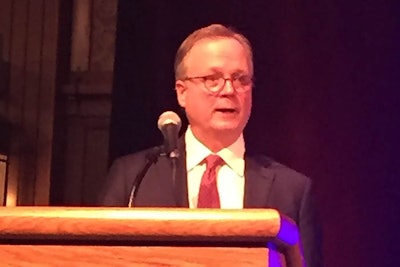
Chicken producers must speak fearlessly, and with clarity, to close the gap between consumer perceptions and reality on issues like “big ag,” animal care and welfare, and food labeling, said Bill Lovette, president and CEO, Pilgrim’s, to listeners at the 2017 Chicken Marketing Summit in Asheville, North Carolina, in July.
Among the consumer issues that are imperatives for chicken producers are slow-growing broilers and antimicrobial resistance. Lovette said the chicken industry is poised to win the competition for consumer dollars on productivity and health issues but faces significant challenges on these key issues.
Lovette offered six best practices for addressing consumer issues:
- Don’t sell your story; tell it with transparency and heart.
- See it through their eyes.
- It’s not about being right; it’s about respect of choice.
- Fearlessly take on the issue, but let values lead the conversation.
- Respond with speed and balance.
- Empower people to advocate and innovate.
He said poultry producers must raise the bar in their communications with consumers who are being bombarded every minute of every day with information that is often inaccurate and potentially undermines agriculture’s ability to continue to provide safe, affordable food.
Lovette said Pilgrim’s has identified priority issues that the company is approaching in a holistic manner: water, energy and climate change, animal welfare, team member health and safety, and product integrity.
He named the following four communication issues for organic production:
- Climate change: Lower yields in organic mean more land, natural resources and birds are required. The result is higher greenhouse gas emissions and a larger carbon footprint.
- Biosecurity: Organic management can result in increased exposure to predators and diseases like avian influenza.
- Cost and scale: Organic agriculture can be more profitable than conventional agriculture, but high labor and input costs can offset gains.
- Productivity: There is a significant yield gap between organic and conventional agriculture, and a lack of feed availability is a challenge.
Sustainability is key to all the alternative production systems, Lovette said. Many consumers may love the image surrounding organic, for example, and some may even be willing to pay for it. “As an agribusiness, we are willing to meet this consumer demand. As agriculturalists, we know converting the entire poultry industry to organic will result in the loss of more resources, an increased environmental footprint and less chicken for our growing population.
“All poultry production systems must become more efficient and more productive if we are going to meet the challenge of feeding the world. Organic is not our only sustainable option,” he continued.
Chicken producers, he said, need to become comfortable addressing these issues fearlessly and with clarity to be able to help solve the challenge of feeding a growing world population when there is consumer pressure to adopt production practices that will not be able to keep up with the world’s food needs.
Chicken Marketing Summit 2018
Chicken Marketing Summit uniquely explores issues and trends in food marketing and consumer chicken consumption patterns and purchasing behavior. In addition to educational sessions, attendees have numerous networking opportunities to foster interaction between speakers and fellow poultry industry peers. Chicken Marketing Summit 2018 will take place at the Four Seasons Resort Orlando at Disney World in Orlando, Florida, July 22-24, 2018.
















